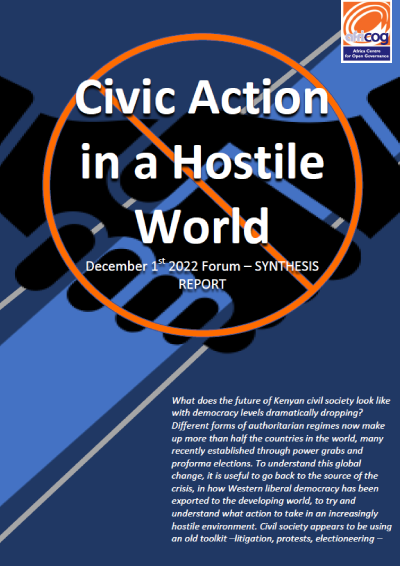In Kenya, there has been a crisis of confidence since 2007 that elections do not reflect the will of the people. At the same time, civil society has become progressively less visible and effective in influencing elections compared to the late 1980s-early 1990s, when it was at the forefront of democratic progress. Activists had pushed through many changes on the streets and in the courts, and could take significant credit for the advent of multi-party politics in 1992 and the unseating of the Moi dictatorship in 2002. Civil society was the vehicle of hope – hope that was partially or temporarily fulfilled until the post-election crisis of 2007-8 triggered the most widespread breakdown of civil order since Independence.
Out of the conflict came the progressive new Constitution with many positive developments, including devolution of power, advances in rights, and the ability to pursue strategic avenues of litigation, protest, research and advocacy. But parallel to this progress was a conservative effort to roll back the gains codified in the Constitution, which has continued to the present day. It was evident in the August 2022 election which produced a president with a significant democratic deficit – just 7.1 million votes of some 14 million voters, and a record eight million people who chose not to vote at all.
This democratic deficit is not special to Kenya; it is part of what is happening globally. Using established indicators for political and civil liberties, Freedom House (US) and the Economist Intelligence Unit Democracy Index (UK) reflects a general consensus in political science literature that democracy has been declining over the last sixteen years.
Authoritarian regimes now form the largest single category, including hybrid states combining aspects of democracy and autocracy. Democratic institutions have become fragile in countries where democracy was thought to be consolidated – the storming of the Capitol in the US, the Bolsonaro impact in Brazil, Viktor Orban’s journey from celebrated liberal to ultra-nationalist in Hungary – and there is a more aggressive promotion of autocratic norms. There is also decreasing pressure on authoritarianism. Prominent democracies have faced a loss of moral authority, particularly since the invasion of Iraq and the War on Terror. The enormous economic clout of China – a communist country that applies both socialist and capitalist principles – has also changed calculations, making democratic countries more shy to criticise. Elections are no longer seen as synonymous with democracy. Even vicious regimes baptise themselves as ‘democratic’ – The Democratic Republic of North Korea – with institutionalised proforma elections conducted for the purposes of respectability rather than change.
Why have the global foundations of democratic stability weakened? The source of the crisis can be found in the origin and export of Western liberal democracy.
